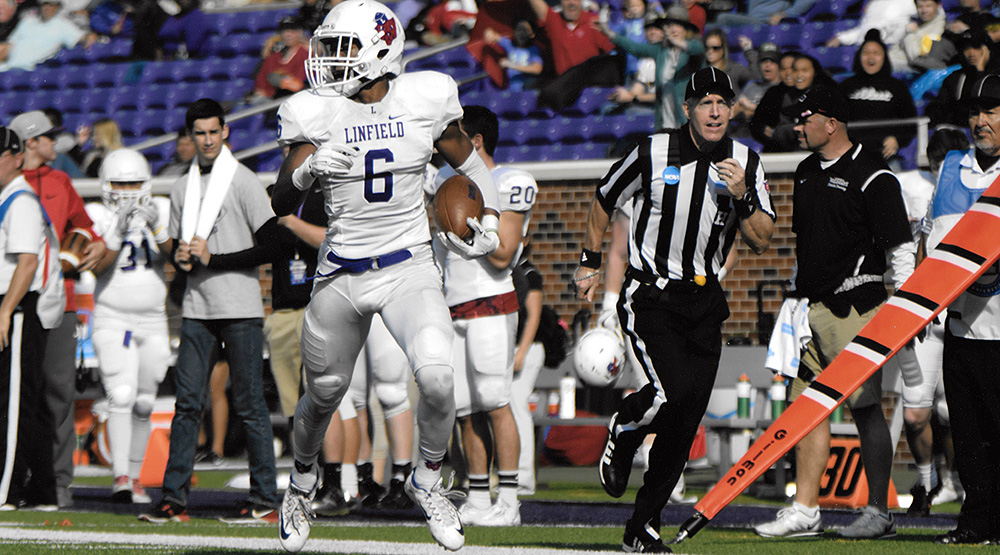
|
| Boyd Marquardt, in stripes, runs up the sidelines alongside Linfield cornerback Kennedy Johnson in a 2016 playoff game at Mary Hardin-Baylor. Provided photo |
By Adam Turer
D3sports.com
In Division III, we know that players play for the love of the game. Coaches coach for the love of the game. Another group that participates for the love of the game is often overlooked.
Officiating college football games can be a thankless job. Like D-III players, officials at this level put in hours of hard work and preparation to do a job on Saturdays in the fall. Unlike the players, there is no glory or victories to be found. While there is some money to be made, it pales in comparison to what their officiating brethren at the Division I level receive.
The officials at this level have much in common with the teams they see each week, and there is a mutual admiration and respect between players, coaches, and officials that is unique to Division III.
“D-III players play for the same reason I officiate: the love of the game,” said Boyd Marquardt. “They don't get athletic scholarships. They're smart kids going to great academic schools. The coaches are really passionate about their players and I think most of them know that their players' academic success and personal growth are much more important than wins and losses.”
Marquardt has officiated in the ODAC, USA South, NACC, CCIW, and MWC. He has spent several years on the same crew as Ralph Carey, who is in his third decade of officiating D-III games.
“A wise supervisor once told me ‘officiating is not about football, it's about people,’" said Carey. “This could not be more true in Division III. The scale of the game makes it more intimate and personal. Athletes are not playing for scholarships, notoriety or a future contract. Coaches are not in it for the money. This frames the experience in a unique way and actually keeps the game closer to its roots as an extracurricular activity meant to provide value to the student athlete.”

|
| Brian Fedje officiates a playoff game between Case and Illinois Wesleyan where the snow is just starting and will only get worse. Provided photo |
With smaller rosters and crowds, Division III games are more intimate. That extends to the relationships between officials and the teams they see week in and week out. That’s especially true for officials who work primarily in once conference.
“You aren't dealing with huge egos at the D-III level. They ultimately know why they are there and they just love to play the game,” said Brian Fedje, who has been an HCAC official for a decade. “That doesn't mean they aren't intense, but they understand the bigger picture. Working in any conference you see the same teams, players and coaches multiple times so you do start to develop friendly relationships with them. That exists at all levels of college officiating, but I think what makes it unique at the D-III level is it's still mostly about the game and the experience and ultimately having fun.”
Like players, the officials have an offseason. There are study groups, clinics, and scrimmages. Each official spends about 20 hours per week studying in preparation for game day. Then, the crew travels together on game day, spending an entire Saturday away from their families. It’s a commitment that requires dedication and passion. While Division I officials make more in one game than a D-III official may make in two seasons, the experience can be more enjoyable when interacting with D-III coaches and players.
“One thing I love about D-III is the athletes are at the schools primarily as students. While they love playing football and play with intensity, they don't have any expectations about playing at the next level. Most D-III schools are very good schools so the players are generally fairly intelligent,” said Fedje. “I love the interaction with coaches and players during the game. As an umpire, I'm talking with the interior guys throughout the game and use that as an opportunity to help manage the game. If they see you as a real person they are more likely to react positively to anything that happens during the game.”
The officiating crew is its own team. They exchange notes in the week leading up to game day. They travel together to and from games, share meals on the road, and talk about their shared love of college football. They know about one another’s families. They support one another in their struggles to balance their day jobs and family life with officiating.
“I think the thing that jumps out at me most is the relationships and the great people that I am fortunate to work alongside. Trusting one another completely is compulsory to doing a good job,” said Sayer Jackson, who officiates in the WIAC, MWC, and NACC. “I have gotten really close with the guys I work with and they have started to feel like extended family members. The camaraderie among fellow officials and crew mates is a really cool part of this avocation that many people who aren't involved with it don't get to see.”
Those friendships make the minimal pay and extensive travel worthwhile.
“Sometimes it's hard to get motivated for a three-hour drive or longer to officiate a 50-point blowout in front of 400 fans. We're held to the same standards and expectations as those working D-I football, but we don't have the luxury of instant replay,” said Marquardt. “What motivates me to come back every year is the great friendships I have developed through officiating. Some of my dearest and closest friends are those I have met through this wonderful avocation.”
Being on the field on game day also allows these former athletes to satiate their desire to remain competitive. Nearly every official played the game at some level, whether it was through high school, a small college, or intramurals.
“I was a competitive high school athlete and I think officiating fills that competitive void for me. I am constantly challenged to get better and be the best that I can be. It also allows me to stay involved with the game and to give back.”— Division III official Sayer Jackson |
“I was a competitive high school athlete and I think officiating fills that competitive void for me,” said Jackson. “I am constantly challenged to get better and be the best that I can be. It also allows me to stay involved with the game and to give back.”
Some former athletes settle into more restful hobbies. These men would rather be on a football field feeling the pressure that comes with wearing the whistle.
“Like the game of golf for many, officiating football is an imperfect art. Golf is about picking the right club and hitting the ball properly to put it on the green then in the hole. Officiating football is about being in the right place at the right time making the right judgment right now,” said Carey. “When all of those things come together it is tremendously satisfying. That experience, along with the fraternity of officials, is what has brought me back to the game as an official for all of these years.”
Marquardt has officiated a thrilling playoff contest in a top-notch stadium when Linfield faced Mary Hardin-Baylor in 2016. He has also spent a long Saturday night slowly driving home in an ice storm after a Grinnell contest played in 35-degree weather. Carey has run through the tunnel in front of nearly 100,000 fans at Michigan Stadium and Notre Dame Stadium. He has spent far more Saturdays on a field where the number of fans in the stands closely equals the number of players on the sidelines.
“The spirit of the game itself remains the same regardless of crowd size,” said Carey. “Officiating has allowed me to interact with thousands of athletes who at the D-III level are playing solely for the love of the game in front of 100 or fewer fans.”
In many ways, these officials are the third team on the field on Saturdays. They prepare up until game time, their competitive juices flow, they experience the same nervous energy leading up to kickoff, then they spend 60 minutes striving to achieve perfection in their roles and boost their teammates.
“I love the preparation for the next game and the anticipation of getting on the field. I love the friendships with the other officials. I love helping new guys getting into college officiating,” said Fedje. “D-III is the initial conduit for many of them, and I love helping them get the opportunity to work and providing feedback to them as they get better. I love traveling to and from games with the crew and learning about the fun things going on in their lives outside of football. I love being on the field with the players and managing the game so everyone plays fair and safe. It's a unique way to be involved in a sport and I have so many great memories from officiating.”
What do you know? Do you know things? Let's find out!
There are so many worthy stories to be told and I can’t find them all on my own. Please share with me those stories that make you passionate about Division III football. If you have suggestions for next week's column, please reach out to me on Twitter at @adamturer or via email at adam.turer@d3sports.com. Thanks for reading!










